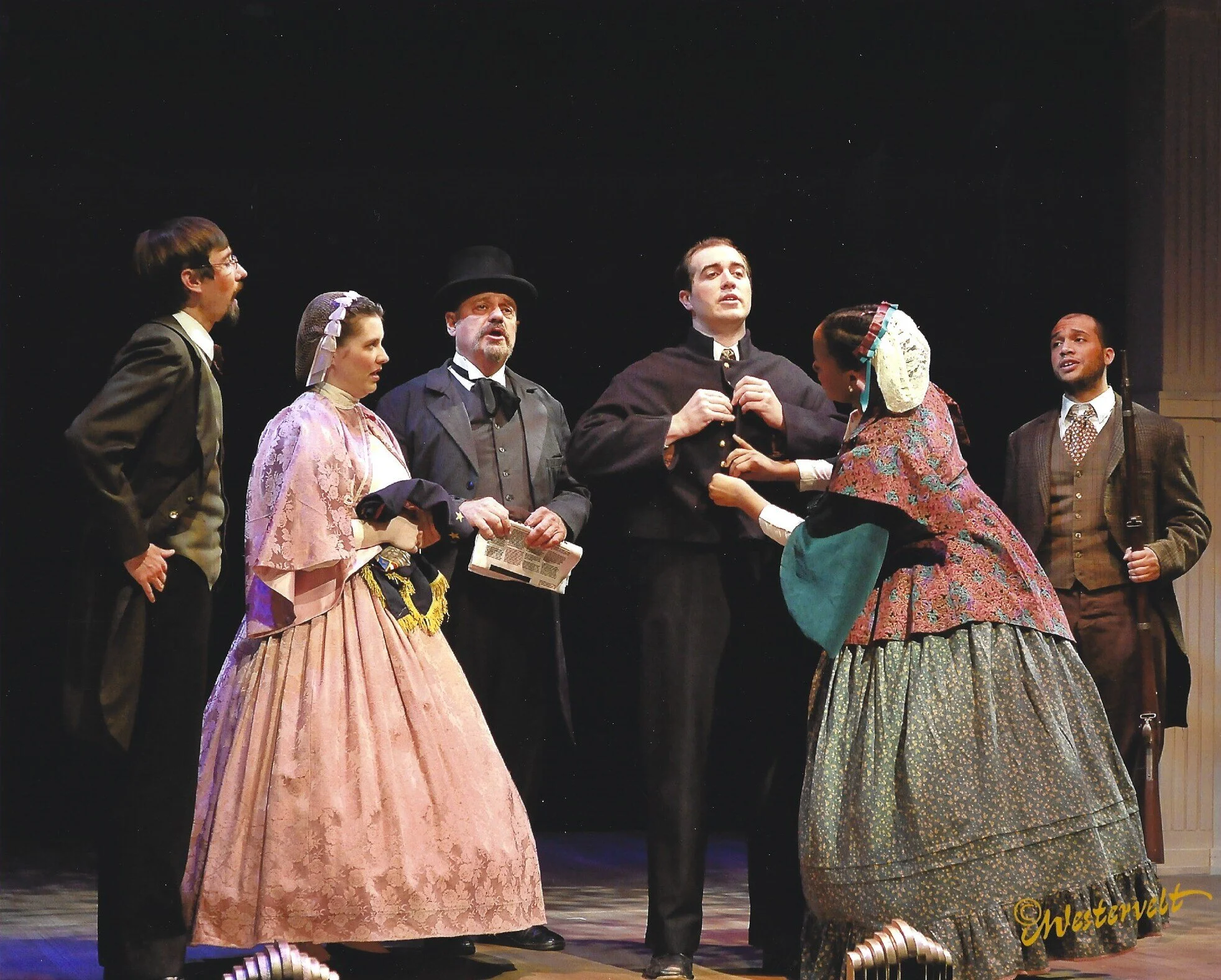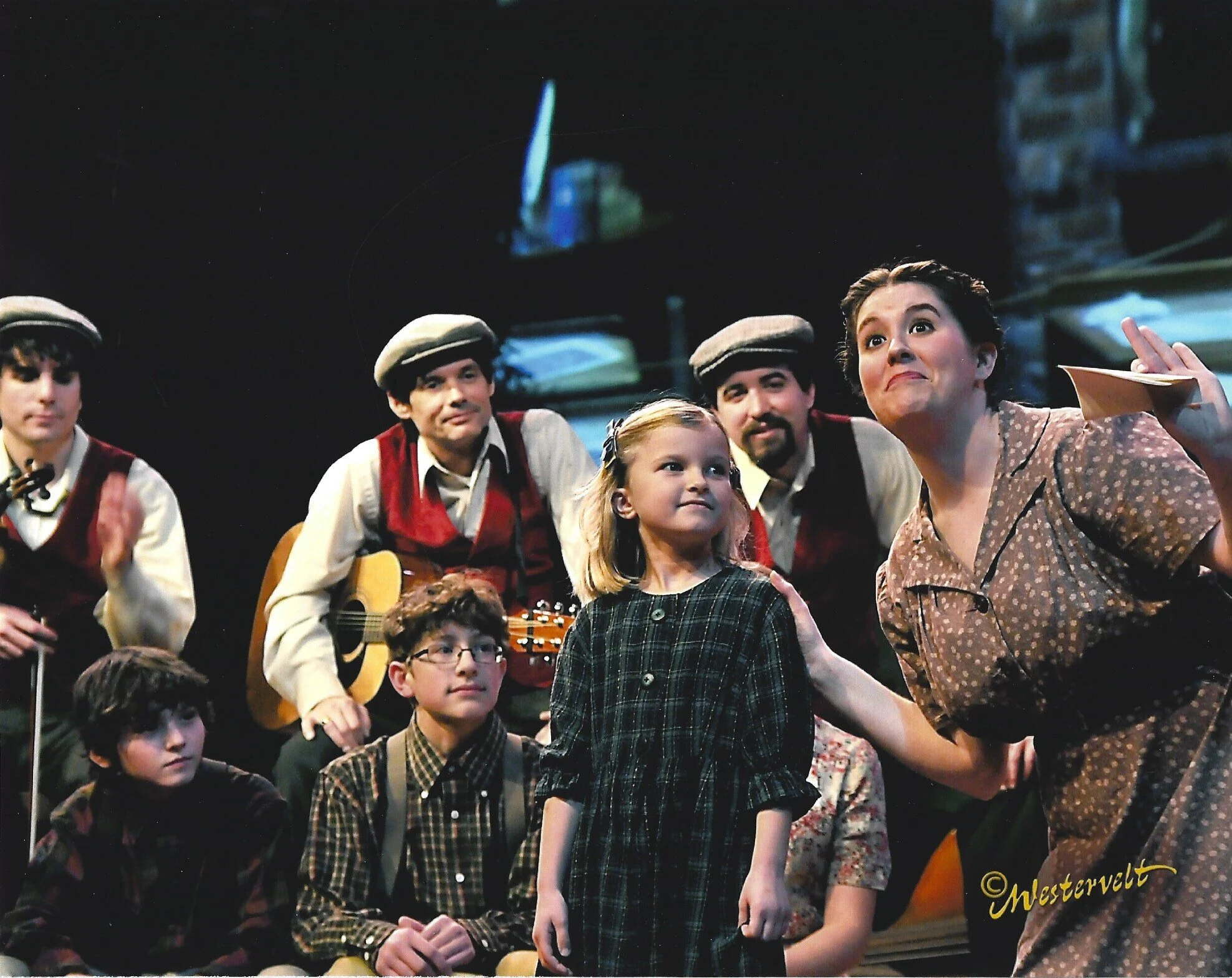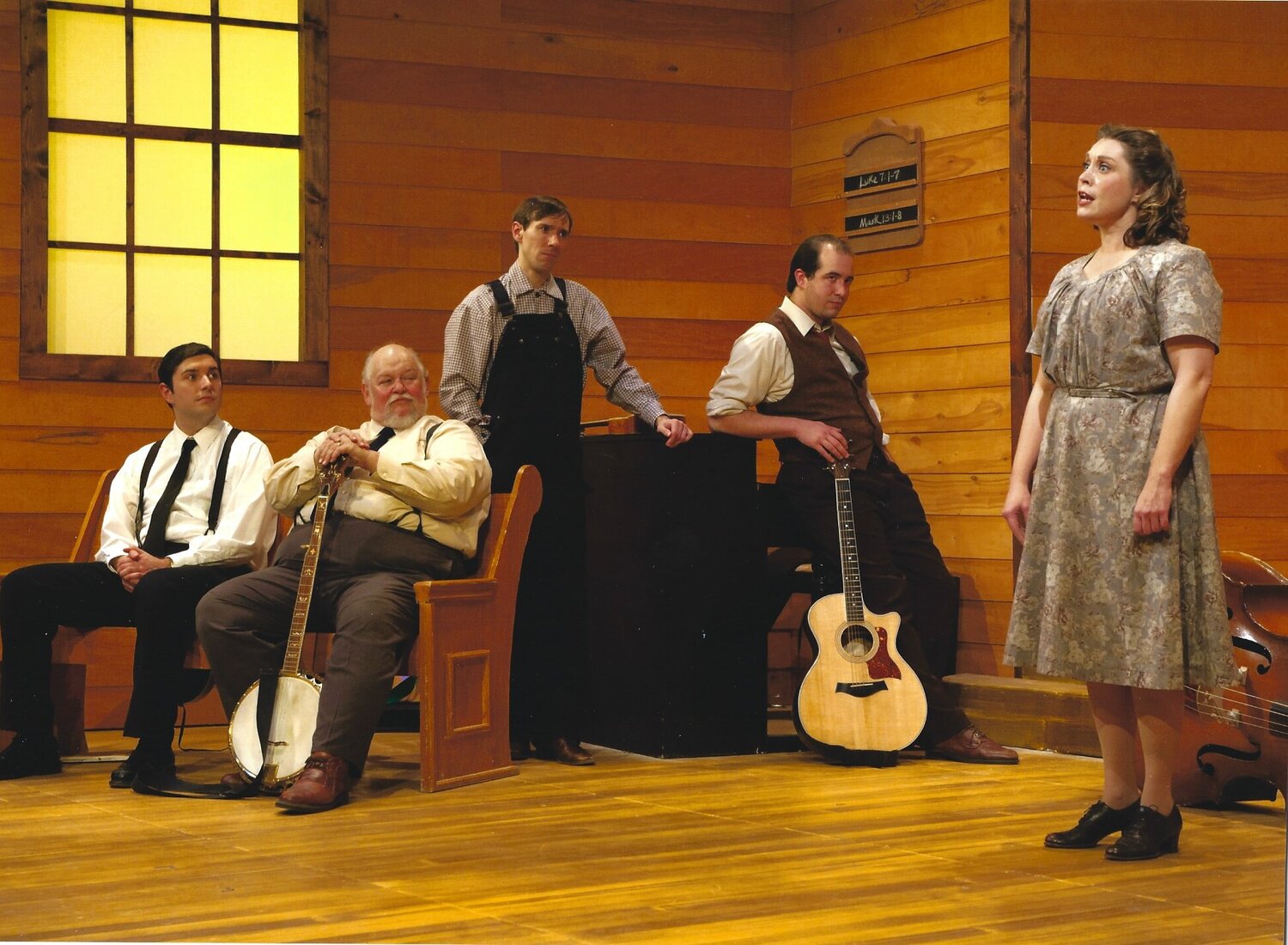Warner Crocker: 2011-2012
The Theatre used the year 2011 to observe its 50th anniversary despite the conflict over its actual starting date. Nevertheless, an excellent article appeared in the Winchester Star that gave the names of previous artistic directors, along with some photographs of earlier productions, and a brief history of the theatre. It is an excellent overview of its historical background as well as touching on its current financial needs (Mangino. “Fine at 50.” TWS. 15 Mar. 2011).
Considering the monetary issues the theatre experienced during the 2010/2011 season, it is amazing that a 2011/2012 season could be mounted. The emergency campaign for $90,000 was a successful venture in that $106,225 was raised over a period of 45 days. This, however, did not eliminate the huge debt of $900,000 that hung over the organization, but it did permit the mounting of a new season.
Unfortunately, as a consequence of this financial crisis, it was necessary to eliminate two staff positions, putting the operational forces at a bare minimum. Another money-saving step was the removal of the theatre’s affiliation from AEA, the Actors’ Equity Association. Wayside had been an Equity Theatre from its very beginning, but it had broken this affiliation for the years 1981 – 1986, again due to a financial crisis.
The abundant press coverage regarding the Theatre’s financial condition led to some speculation about Wayside’s value to Middletown. Some residents report that when the Theatre spent the year in Front Royal, “town businesses saw their sales drop by about 40 percent,” stated Middletown Mayor, Marshall J. “Mark” Brown. He added, “A Wayside closure would be ‘a death knell’ to the town’s small business community” (Mangino. “Officials: Wayside will ….” TWS. 27 Aug. 2011). On the other hand, some felt that while it was nice to have the Theatre located in Middletown, the move to Front Royal did not affect all businesses. One source stated that the Theatre was important to his business, but not vital. “I found out when they moved to Front Royal for a year that I did quite well because I had established steady regulars that come.” Another, a restaurant owner, noted that only about five percent of his business could be credited to the Theatre. And, when asked if Middletown relied on the Wayside Theatre, the response was a definite ‘No.’ (Bradshaw. “Small-town drama.” TWS. 29 Oct, 2011).
The publicity for the opening of the 2011/2012 season all stated this as being Wayside’s 50th season. That would be true if the Theatre had begun in 1961. But, as mentioned earlier in this document, available information indicates that Wayside’s first season was in 1963 leaving the years 1961 and 1962 still shrouded in mystery.
Reunion. June 4 - July 2, 2011. Steve Przybylski (L), Donna Colagiovanni, Bob Payne, Jody Lee, Sehri Wickliffe, Brett Tubbs.
Nevertheless, Wayside’s season began with a rousing production of Reunion: a Musical Epic in Miniature, that was preceded by a 50th anniversary gala at 5:00 p.m. held in the Theatre’s Curtain Call Cafe prior to the 8:00 curtain. Crocker felt that Reunion, “while not a new show, is being performed at Wayside for the first time, and is an appropriate season opener.” He adds, “while we are carrying way too much debt,” he feels “the season will represent a change in direction, focusing on addressing the theater’s past challenges and building it into the future” (Mangino. “Wayside poised to lift ….” TWS. 4 June 2011).
In his pre-show welcome, Crocker announced that the theatre’s interior space was now named the James R. Wilkins auditorium in appreciation for his $100,000 donation to the Theatre. This news received enthusiastic applause.
Reunion was noted to be in the style of a “Ken Burns approach to history as it relies on words of those who lived through the epoch,” wrote one reviewer who added that the staging was “enhanced with old photographs projected on a screen.” He adds that all the music comes from the Civil War, many of the selections were familiar, some new. “The ensemble blends well in the songs and shows versatility with a variety of instruments” (Horan. “ ‘Reunion’ tells Civil War ….” NVD. 9 June 2011). Another reviewer noticed that in this production, “The actors rarely address one another. Instead each recites pieces reflecting the feelings or observations of actual people from the period” (Seabrooke. “Wayside kicks off ….” TWS. 9 June 2011). In general, it was felt that Reunion was well done, musically. But, the problem with the show is, “we already know the story … the ultimate impact is dulled by familiarity and lack of any sustained personal conflict.” The critic concluded that this type of stage production “may help sustain the celebratory fireworks but lacks the spark that lights the fuse” (Lawrence. “Civil War theme ….” CSE. 11 June 2011).
The Nerd. July 16 - Aug. 13, 2011. Dana Colagiovanni (L), R. Scott Williams, James Fleming, Jody Lee.
The next production was the very popular comedy, The Nerd, which had first appeared on Wayside’s stage in 1990. This title featured a cast of actors who had all appeared in previous Wayside productions. One writer, commenting on the 2011 production, notes that, while the play begins innocently, it quickly turns into broad comedy, or perhaps slapstick. “First you take off your shoes and socks” begins one game, “then you put a paper bag over your head and poke an eye hole in it. Then the shoes and socks get thrown out the window.” And, that was only one example of the antics on stage. “If one likes wild characters and silly nonsense, this is your show. Or, if you are looking for a bit of frivolous entertainment for the summer evening,‘The Nerd’ will provide it.” In addition to the craziness that is displayed, you will see “an extremely talented cast” (White. “Wayside blasting back ….” TWS. 21 July 2011). The set was noticed and cited as being the perfect apartment “for a struggling career man in the Midwest in the 1970s, [enhanced] with appropriate lighting” (White. 21 July 2011). Yes - - it was a crazy, high energy show!
In The Nerd, there is a scene where the cast eats deviled eggs. In order to help with food preparation, and “because actors are lousy cooks,” a request was made to theatre patrons for donations of deviled eggs, as a dozen were required for each performance. For the run of the show, about 15 dozen eggs were needed, with three dozen needed on weekends. At the end of each of the five weekends, a vote was made by the cast to determine the winner for the week. “Each of the five winners will receive two ‘pick-3’ subscription for the season along with two tickets for the Christmas show, premiering in December” (“Wayside Theatre needs ….” TWS.. 9 July 2011). Other than this announcement, no other information exists regarding the success of the deviled eggs request.
Steel Magnolias. Aug. 27 - Sept. 24, 2011. Sarah Melinda (L), Faith Potts, Emeline Faith Thompson.
The very popular play, Steel Magnolias, that had first appeared at Wayside during the 1990 season, was next on the calendar. This 2011/2012 performance reunited several actresses who had performed in the 2000 production. As background, the cast received a ‘crash-course’ in the beauty business by visiting Ed’s Heads salon in Stephens City. While they did not work on any of the customers, they did observe procedures as, “The cast members wash and roll each others’ hair, and create updos” as part of the action (Mangino. ‘Wayside actresses brush ….” TWS. 19 Aug. 2011). After 25 years on the theatre circuit, the script of Steel Magnolias illustrates “the strong (steel) Southern women (magnolias) [that] resonates with poignant truths about friendship and love.” In addition, there is much to laugh over, such as the reference to the “Miss Soybean beauty pageants, how many shades of pink there are, football, sharing vegetables, and having a casserole ready to deliver to a neighbor when a sad occasion arises …” (White. “Wayside Theatre’s ‘Steel Magnolias’ ….” TWS. 2 Sept. 2011. This production was performed by highly capable actresses who exhibit strong emotions and delightful humor, as they portray a “beauty shop [that] is a microcosm of Southern women for whom life must go on” (White. 2 Sept. 2011).
The Woman in Black. Oct. 8 - Nov. 5, 2011. David Millstone, Jody Lee.
The traditional mystery slot was filled with the production of The Woman in Black, that had first been seen during the 2000 season. This spine-tingling work is the second longest running play in London. In this two-actor play, each take on various roles as they tell the eerie mystery set in a town on the east coast of England. Much of the suspense in this story relies on the creepy set as well as the eerie lighting that will come on briefly to show the shadow of a woman, but fades so quickly one isn’t sure if anything were seen. Horan credits the strong actors for their ability to heighten the tension when they trade roles to act out the tale. He writes, the director “elicits taut performances from the two actors … [who] convincingly run the gamut from dread to fright and horror” in portraying the story (Horan. “Thriller builds ….” NVD. 13 Oct. 2011). While the first act is a bit tedious, states one writer, “Act II gives the audience its money’s worth … The nightmare sequence is so effective that when it ended, scattered titterings could be heard from audience members charmed by their own fright” (Lawrence. “ ‘Woman’ in black ….” CSE. 14 Oct. 2011).
Glory Bea! Nov. 26 - Dec. 24, 2011.
Glory Bea! A Shenandoah Valley Christmas Show, the Christmas production for the 2011/2012 season, was a premier written by two actors who had long connections with Wayside: Rich Follett and Larry Dahlke. The two writers, one living in nearby Front Royal, the other in Chicago, communicated via email, telephone, and other electronic forms to develop the script and compose the music. Set in the Shenandoah Valley, the story is told and commented upon by a trio who sing and play fiddle, bass, and guitar. “All three give emotional performances that take the audience back to a time of uncertainty and living off the land” (Lowe. “Wayside’s ‘Glory Bea! ….” TWS date). A strong visual impact was made with the use of photographs by J. Clinedinst from Edinburg, Virginia, that “seamlessly decorated the set with vivid slides showing every aspect of Shenandoah Valley, including wildlife and views” (Barr. “Hallelujah to ‘Glory Bea!’ ” Warren County Report, Mid Dec. 2011). As was the practice for other Christmas productions, the show was double cast. While the majority of reviews find this Christmas show to be enjoyable, one reviewer found the script to be weak and wondered if the theatre were playing it safe due to its financial status. She urges, “No more local taped together scripts. No more struggling family of musicians stories … You can lead your subscriber base into fresher fields …” (Lawrence. “A Shenandoah Christmas …” CSE. 9 Dec. 2011). As is often the case, this Christmas show was a winner at the Box Office!
Smoke on the Mountain. Jan. 29 - Mar. 10, 2012. Alex Sheets (L), Roger M. Eaves, Steve Przybylski, Jody Lee, Thomasin Savaiano.
The 2011/2012 season continued after the New Year with Smoke on the Mountain, that had been seen during Wayside’s 2005/2006 season. This title and others like it had become favorites with the Wayside audiences. Several in the cast had performed in previous Sanders Family productions at Wayside, including Bob Payne, who had to be replaced at the last minute due to illness. Fortunately, an actor, who had also been in several Sanders Family productions around the country, was available. All the reviews agree that this type of musical is most enjoyable, and Wayside’s attendance reflects this opinion. One reviewer, after reflecting on why this evening of hymn singing was so popular, concludes, “This play lets us relish parts of our heritage that we’ve outgrown, inexorably, whether we wanted to or not. And we love it for that” (Dewey. “The Sanders Family ….” Shenandoah Press. 26 Mar. 2012). Another states, “Smoke on the Mountai is a sure-fire antidote to the winter blahs” as it offers gospel hymns “performed impeccably, interspersed with liberal dashes of humor from the off-beat characters.” And concludes “Even an atheist should be impressed by the musicianship and versatility of the cast” as they “sing with verve, flawlessly blending close harmony … and demonstrate a facility with a variety of instruments …” (Horan, “ ‘Smoke on the Mountain’ ….” NVD. 2 Feb. 2012).
Greater Tuna, March 24 - April 28, 2012. Greg Pragel (L), Eddie Staver III.
The season closed out with Greater Tuna, a title that had previously appeared on Wayside’s stage during the 1987, 1992, and 2002/2003 seasons. This popular two-man show features at least twenty different, over-the-top characters. It is a joy to watch for the quick costume changes as well as the various zany mannerisms that each actor uses. Another writer states, “Part of the fun becomes wondering how quickly the actor will return from off-stage and who he’ll be when he does.” He adds, “The show is like two worlds operating at once—the one the audience sees playing out onstage and the one behind the scenes where the actors prepare in a frenzied rush before hurrying back out on stage between sketches” (Keelor. “Greater expectations.” NVD. 22 Mar. 2012). Another reviewer states, “Both men do an excellent job of portraying young as well as older women and men,” and concludes, “Cross-dressing is taken to the widest, greatest extremes during Wayside’s ‘Greater Tuna’ ” (Lowe. “Wayside’s ‘Greater Tuna’ ….” TWS. 30 Mar. 2012).
Once again, Tuna had provided Wayside Theatre with the sale of a goodly number of tickets and put some much needed cash in the coffers.






